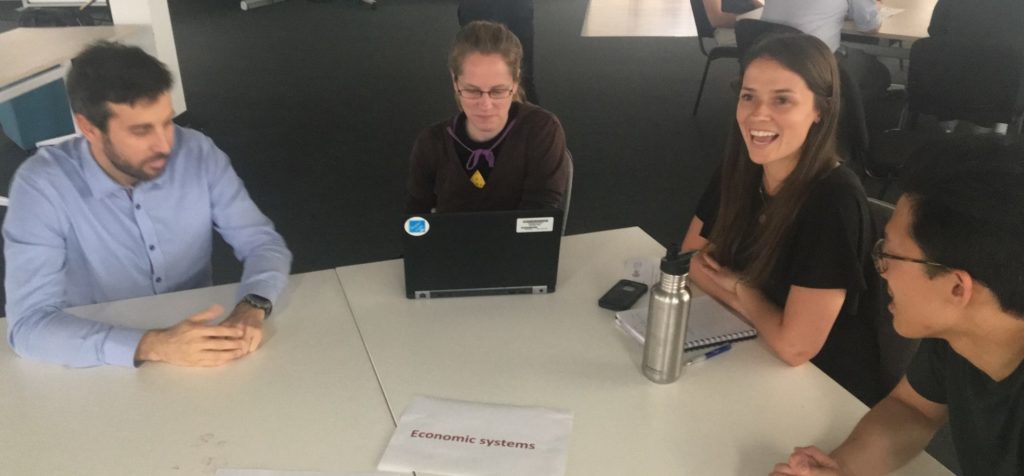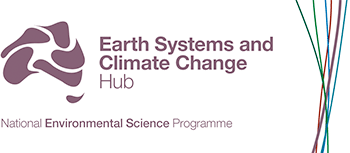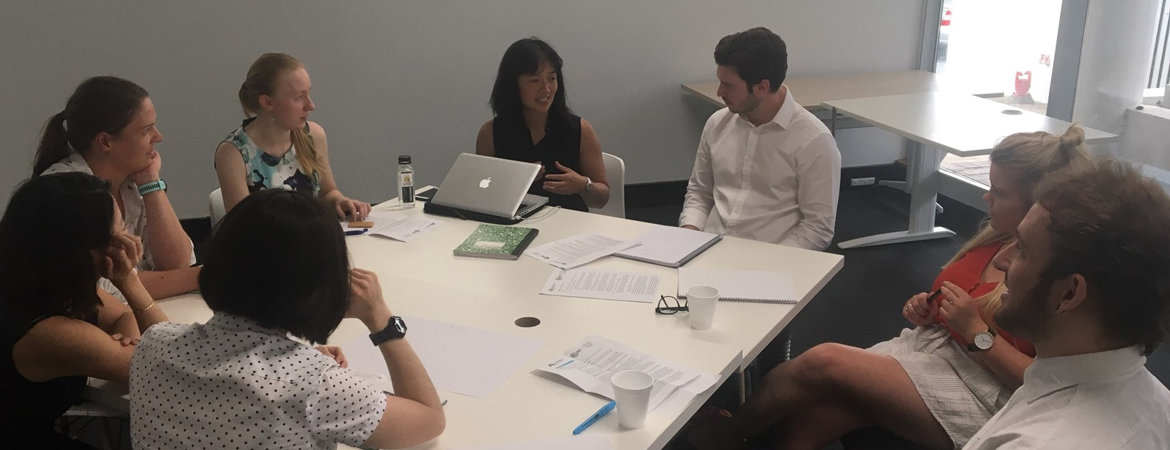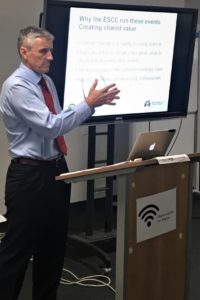16 November 2018
Earlier this month over 40 early career researchers, Australian Capital Territory (ACT) and Australian Government policy makers, consultants, ACT health and emergency sector workers met for the fourth Earth Systems and Climate Change (ESCC) Hub Young Professional event.
Young Professional events pose hypothetical climate scenarios which challenge participants to consider thought-provoking questions about how Australian society can best respond to the impacts of climate change, and what the scientific data and information needs are of decision-makers.
This particular event was co-hosted by the ACT Government Environment, Planning and Sustainable Development Directorate and the Australian Government Department of the Environment and Energy.
The ACT Minister for Climate Change and Sustainability, Mr Shane Rattenbury MLA, gave an opening address to welcome participants and kick-start the event.
The scenario
It’s 2032 and Canberra is experiencing extreme weather events that trigger systematic failure in public services and infrastructure.
In this scenario, Canberra is continuing to experience a range of extreme weather events including:
- Numerous consecutive days exceeding 35°C and even a few days over 40°C
- Bushfires in the surrounding national parks, cutting off access to Batemans Bay and potentially polluting Canberra’s water supply
- Drought across much of the southern Murray-Darling Basin
- Dust storms across the city, affecting air quality and visibility.
These conditions are affecting Canberra’s city services and infrastructure. The electricity network is stretched. Office workers are sent home as there is no way to keep buildings cool. Peak hour traffic intensifies as people opt for air-conditioned private cars over buses. There are increased presentations at Canberra’s hospitals due to heat-related illnesses and asthma attacks. Paramedics, firefighters and police remain on high alert and are working unsustainable hours to manage emergency situations.
Participants were asked to consider what they, as young professionals and future decision makers for Canberra, could do to help reduce the risks from the changing climate. What are the critical interdependencies within the ACT and Canberra city system that may be affected by this scenario? What needs to be considered for effective adaptation going forward? And what associated climate data and information needs to inform decision-making to better plan for the scenario?
Participants identified critical issues and developed innovative responses across four policy challenges:
- Water security
- Built environment including transport and electricity
- Health, wellbeing and social resilience
- Economic systems
Examples of potential responses and ideas for the scenario identified by participants include ensuring adequate greenspaces in and around Canberra to not only reduce the impacts of the urban heat island effect but also act as district water storage areas, roll out smart water meters in residential Canberra buildings and provide clear education on their use, better define and understand heat stress points for Canberra’s community and infrastructure, review the national construction code to ensure extreme heat and other climate change impacts are adequately considered, provide incentives for more resilient buildings through first owners grants, consider insurance risks and climate impacts on credit ratings, and identify and prioritise actions, policies and programs which increase community and economic resilience to future climate change extremes.
The benefits of building networks
Over the course of the afternoon, participants shared their expertise and knowledge, built networks and discovered the benefits of using science-based climate change knowledge in developing solutions to this scenario.
Young Professional events draw together a range of participants from across different backgrounds, including government, research, industry and private sector, to consider complex and multi-faceted climate challenges. These events aim to assist our next generation of leaders in building strong and lasting relationships and capacity across sectors, to consider challenges from different angles and to understand how their expertise and knowledge can play an important role in the overall solution to future climate challenges for Australia.
Michelle Ho, CSIRO, was encouraged by the ability of the young professionals to understand the benefit of science for informing decisions and solutions. ‘I thought it was a positive outcome that my group was able to identify (without my prompting) the value of research in providing information to decision makers. They recognised that researchers could highlight issues that they may not have previously considered and help in dispelling preconceived notions that weren’t supported by science’.
ACT Government participants enjoyed the chance to meet with like-minded professionals to ‘discuss how we can begin planning for future climate change and its impact on Canberra’.

ESCC Hub climate scientist Claire Trenham (second from left) and other participants discuss the economic implications from the scenario
The Young Professional events also serve to raise stakeholder awareness of the role of the ESCC Hub’s research in Australia, as well as the utility and accessibility of climate science data and information services more generally. The Hub plans to hold additional events throughout 2019 to continue to bring together young professionals and climate researchers in considering potential future climate risks and challenges for Australia.
The event was facilitated by Dr Nick Wood, Chair of the ESCC Hub Stakeholder Advisory Group, and was supported by early career climate scientists from across the ESCC Hub, the Clean Air and Urban Landscapes Hub and the ARC Centre of Excellence for Climate Extremes.


